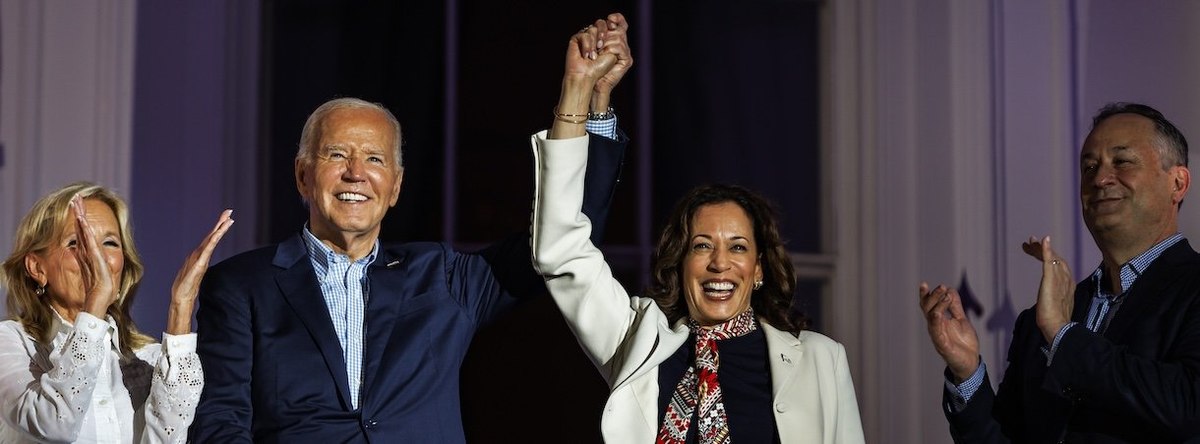This week’s Economist/YouGov poll covers Kamala Harris stepping in as the presumptive Democratic nominee, how she fares against Donald Trump, the Republican convention, the attempted assassination of Trump, the Israel-Hamas war, the Russia-Ukraine war, and the Summer Olympics.
Harris steps in as Biden steps aside
- This week's poll — conducted entirely after President Joe Biden withdrew from the 2024 presidential election — finds that about three-quarters (77%) of Democrats strongly or somewhat approve of Biden's decision and only 17% disapprove
- Among Americans overall, 74% approve and 16% disapprove
- Democrats overwhelmingly approve of Vice President Kamala Harris becoming Biden’s replacement as the Democratic Party’s presidential nominee: 85% approve and only 10% disapprove
- When Democrats are asked to choose between Harris and three other prominent Democrats, 61% choose Harris while each of the other three — California Gov. Gavin Newsom, Michigan Gov. Gretchen Whitmer, and Georgia Sen. Raphael Warnock — gets 6% or less
- Among other prominent Democrats polled about whom Harris might pick as her running mate, Mark Kelly, Josh Shapiro, and Warnock are viewed favorably by about as many Americans as view them unfavorably
- Americans are evenly divided on whether Harris is qualified to be president: 43% say she is qualified and 43% say she is not
- Democrats overwhelmingly say Harris is qualified, by 84% to 9%
- 55% of Americans hope the U.S. elects a woman to be president in their lifetime; only 24% say they don't
- 49% of men and 59% of women hope for a woman to be elected as president in their lifetime
- 62% of adults under 45 and 49% of older adults hope this happens
- 25% of men and 23% of women do not hope a woman is elected to be president in their lifetime
- Only 20% of Republicans and 21% of conservatives say they hope for a woman to be elected as president in their lifetime — perhaps because the most likely way this would happen in the short term is for Harris to defeat Donald Trump
- 52% of Americans say the country is ready to elect a woman as president while 19% say it is not
- Americans' belief that the country is ready for a woman to be elected president, and hope that it will happen in their lifetime, both have fallen since May 2015 — just after Hillary Clinton announced her candidacy for president
- Now, 52% think the country is ready and 55% hope for it in their lifetime; in May 2015, 61% thought the country was ready and 60% hoped for it in their lifetime
- Republicans were almost evenly divided on the question in May 2015: 38% hoped for a woman to be elected president and 36% did not
Harris vs. Trump
- In a five-way contest — against Trump, Robert F. Kennedy, Jr., Jill Stein, and Cornel West — Harris polls about as well in her first days as the likely nominee as Biden did just before he left the race
- This week, 44% of registered voters say they would support Trump while 41% would vote for Harris
- Among many demographic and political groups, Harris’ share of the intended vote is approximately what Biden’s was before he stepped aside
- The share of Harris supporters who are extremely or very enthusiastic about voting this year (62%) is higher than the share of Biden supporters who were enthusiastic according to last week's poll (52%)
- Last week, there was a 20-point gap in reported enthusiasm in voting this year between Trump and Biden supporters (72% vs. 52%); this week that gap — now between Trump and Harris supporters — has been cut to 13 points (76% vs. 62%)
- The enthusiasm gap between Democrats and Republicans also has closed somewhat
- This week, 62% of Republicans and 54% of Democrats are extremely or very enthusiastic about voting, for a gap of 9 points
- Last week, 65% of Republicans and 43% of Democrats were enthusiastic, for a gap of 22 points
- Among registered voters, Trump is seen as the more likely winner (52% say he is more likely, while 34% say Harris is) — just as as he was against Biden according to last week's poll (50% said Trump, 29% said Biden)
- Harris supporters are more hopeful than Biden’s were a week earlier: 75% of Harris supporters say she will win, compared to 63% of Biden supporters who expected him to win the week before
- Nearly all Trump voters expect victory in November: 95% in this week's poll, 91% in last week's
- More than nine in ten Harris and Trump supporters say their minds won’t change between now and the election (93% and 95%)
- Among supporters of other candidates, half (51%) say their minds could change
- 49% of registered voters prefer Trump to Harris if they were the options and 48% prefer Harris to Trump
- If undecided and third party voters had to choose between Harris and Trump, more would select Harris, by 50% to 33%
- Nearly nine in 10 Trump supporters (87%) watched or read about the Republican convention last week
- 61% of Americans see the Republican Party as more united than divided, in this poll conducted after the convention ended; less than half (47%) said that a week earlier — in a poll conducted just after the assassination attempt on Donald Trump
- Republicans overwhelmingly believe J.D.Vance is a very or somewhat good choice for vice president: 75% say this while 7% call Vance a bad choice
- 83% of Trump supporters say Vance is a good choice while 4% say he is a bad choice
- Americans overall are more likely to call Vance a good choice than a bad one (39% vs. 29%)
- Only 29% of Americans say Vance is qualified to serve as president, while 37% say he is not qualified
- Among Trump supporters, 68% say Vance is qualified and only 7% say he isn't
- 61% of Americans think Vance is conservative, including 32% who say he is very conservative — compared to the 58% who describe Trump as conservative, including 30% who say he's very conservative
- Far more Trump supporters expect Vance will help (60%) rather than hurt (3%) Trump's chances of winning the election
The attempted assassination of Donald Trump
- Nearly all Americans (97%) say they've heard at least a little about the attempted assassination of Trump at a July 13 rally, including 76% who say they've heard a lot about it
- Most Americans (63%) say the attack "represents a broader problem in American society," while only 24% say it's an isolated incident
- But Americans don't agree about what broader factors played a role in the shooting; bipartisan majorities blame the shooter himself and mental illness, but Democrats and Republicans split over many other alleged factors
- Republicans are more likely to blame the Secret Service, the news media, and rhetoric from Joe Biden and Democrats for the attempted assassination; Democrats are more likely to blame gun laws and rhetoric from Donald Trump and Republicans
- Likewise, though many Americans aren't sure what motivated the shooter to attempt to assassinate Trump, Republicans are more likely to think he was motivated by political beliefs while Democrats are more likely to say it was some other motivation
- A majority (57%) of Americans say the attempted assassination will help Trump's chances to win the presidential election while only 3% say it will hurt Trump's odds
- Only 29% of Americans now say the Secret Service is doing an excellent or good job
- Even fewer Trump supporters (14%) say that
- 84% of Trump supporters and 52% of Harris supporters are only somewhat or not at all confident that the Secret Service can protect presidential candidates from harm
Foreign affairs
- Americans lack consensus about whether the U.S. government should provide military aid to Ukraine, to Israel, to both — or to neither
- 59% of Americans sympathize more with Ukraine in its war with Russia, while just 3% sympathize more with Russia
- Another 27% sympathize with neither side, and 12% aren't sure
- U.S. opinion is more divided in the Israeli-Palestinian conflict: 33% of U.S. adult citizens sympathize more with the Israelis, 19% more with the Palestinians, and 24% with both sides equally; 25% are not sure
- Since the immediate aftermath of Hamas's October 2023 attack on Israel — a period when U.S. sympathy for the Israelis rose compared to before the attacks and sympathy for the Palestinians decreased — those trends have reversed
- 45% of Americans say the U.S. should provide the same or more military aid to Ukraine, while 39% say the U.S. should provide the same or more military aid to Israel
- Overall, 23% of U.S. adult citizens say the U.S. should maintain or increase its military aid to both countries, and 18% would decrease its military aid to both countries
- 18% would increase military aid to Ukraine and decrease military aid to Israel
- 12% would increase military aid to Israel and decrease military aid to Ukraine
- Democrats are more likely to support military aid to Ukraine, and Republicans are more likely to support military aid to Israel
The Paris Olympics
- One-third (33%) of Americans don’t expect to watch any of the Paris Olympics, which officially begin Friday with an opening ceremony on the River Seine
- One-third (33%) haven’t heard anything at all about it
- 34% say they would want to see the Paris Olympics in person, if they could attend – and afford it
- Adults under the age of 45, Black Americans, Hispanic Americans, and Democrats are more likely to say they would want to attend, but in none of these groups does a majority want to attend
- Most Americans (61%) have at least some confidence that the Olympics will be safe from terrorism, relevant because of the 2015 terrorist attacks in the Paris area that included among its targets the stadium that will host Olympic track and field events
- Men's favorite summer Olympic events to watch are basketball, swimming, and track and field; among women, favorites are gymnastics, swimming, and diving
Throughout this report, some numbers may appear off by 1 because of rounding
— Carl Bialik and Taylor Orth contributed to this article
See the toplines and crosstabs for the July 21 - 23, 2024 Economist/YouGov Poll
Methodology: The poll was conducted among 1,605 U.S. adult citizens. Respondents were selected from YouGov’s opt-in panel to be representative of U.S. adult citizens. A random sample (stratified by gender, age, race, education, geographic region, and voter registration) was selected from the 2019 American Community Survey. The sample was weighted according to gender, age, race, education, 2020 election turnout and presidential vote, baseline party identification, and current voter registration status. Demographic weighting targets come from the 2019 American Community Survey. Baseline party identification is the respondent’s most recent answer given prior to November 1, 2022, and is weighted to the estimated distribution at that time (33% Democratic, 31% Republican). The margin of error for the overall sample is approximately 3%.
Image: Getty (Samuel Corum / Stringer)
What do you think about the election, American politics in general, and everything else? Have your say, join the YouGov panel, and get paid to share your thoughts. Sign up here.
















